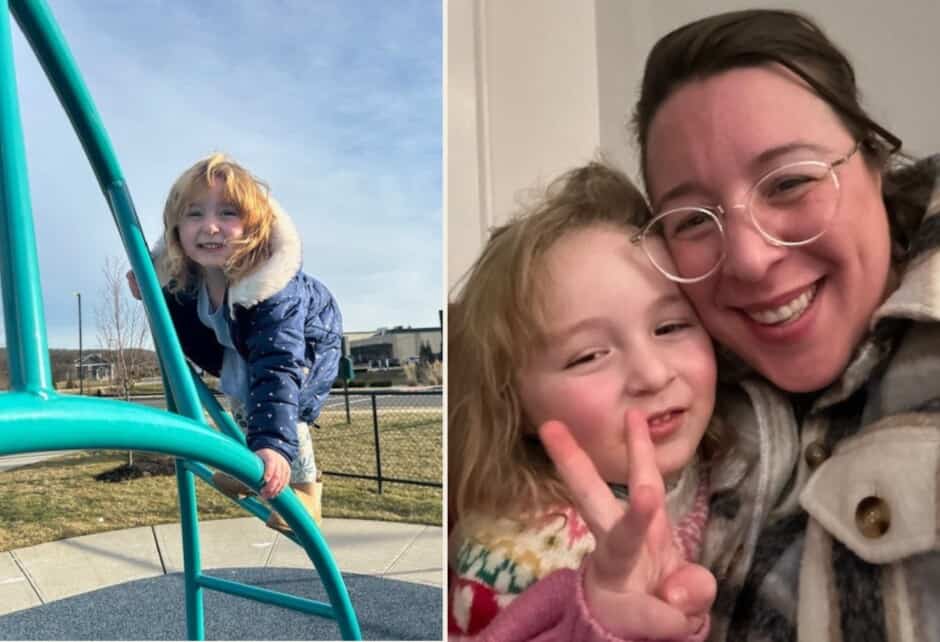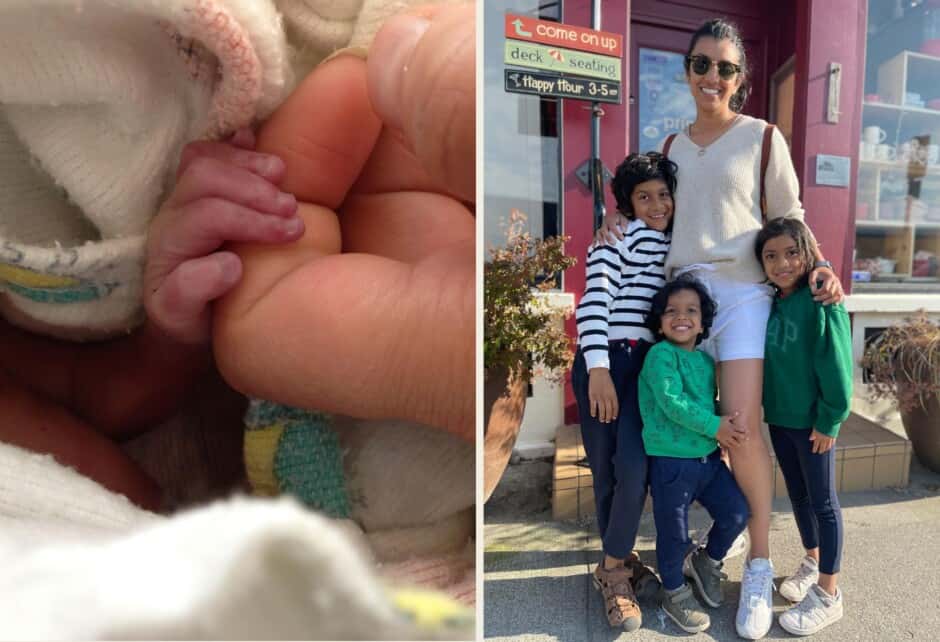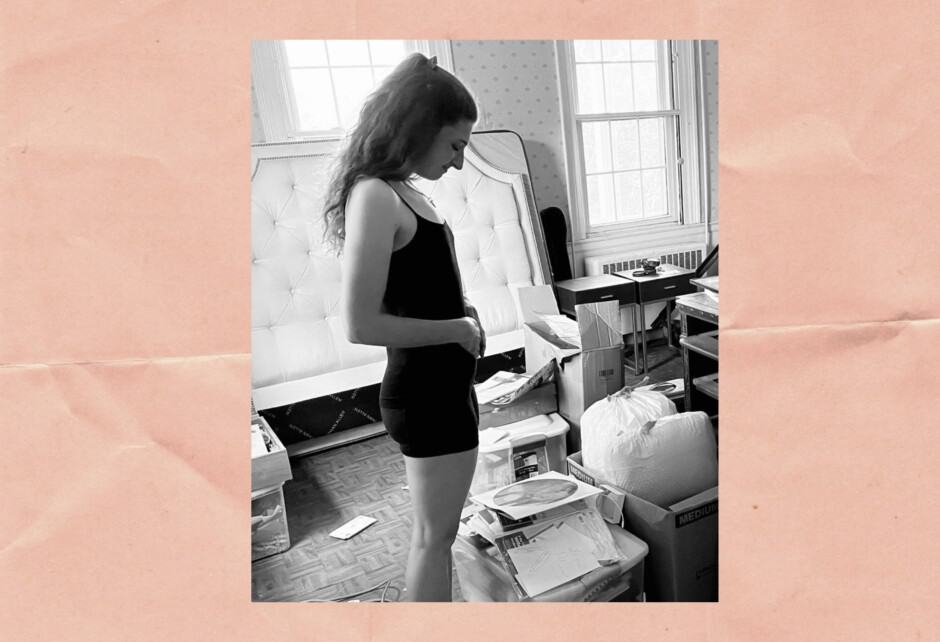
Mom Talk: I Want to Talk About Being Black and Pregnant
Written by Rio Cortez
Photography by Photo courtesy of Rio Cortez
Having a baby changes us in countless ways, one of which is the way we talk—especially the way we talk to other mothers. Formally taboo topics like cervical dilation, engorged breasts, hemorrhoids, miscarriage, and poop (oh, so much poop) are suddenly perfectly acceptable subjects of discussion. In this week’s Mom Talk, Rio Cortez (best-selling author of The ABC’s Of Black History) describes how her own pregnant belly became something on an invitation for women—those she knew, and many that she didn’t—to share with her the most personal of stories. She beautifully expresses the importance of these communications, especially among Black women, and admits that since giving birth to her daughter a few months ago, she can’t stop talking either. Rio is a Pushcart-nominated poet whose work has appeared in publications including The Miami Rail, The Offing, Poetry Society of America, and Buzzfeed. She lives in Harlem and works at the Schomburg Center for Research in Black Culture.
I recently overwhelmed a pregnant woman with personal questions and overshared totally about my personal health and life. I attended a gala dinner, supporting Black women and girls, when I was six months postpartum, and I was seated next to a woman in her third trimester. I hadn’t been out of the house much, except to work, since the baby was born. No one close to me was experiencing motherhood, and I knew I should hold back more, and let this woman be, but I could not stop talking. I was going through the most disruptive and wonderful thing in my life, and felt that no one would want to hear about it, except this pregnant stranger, for some reason.
I’m generally a reserved, earth-sign of a person. And now, I guess, I am living a less private life. As a cis woman, my entire existence, since adolescence, I was taught how not to become pregnant. I had many methodologies to choose from in achieving this goal: pills, surgically implanted devices, patches. If all else failed, I had access to Plan B. I had the option of an abortion. My teenage friends practiced not getting pregnant, my college friends practiced not getting pregnant, even most of my adult friends practiced not getting pregnant. And when I became pregnant, on purpose-ish, at 32 years old, I realized I had practically zero information about childbirth, no known standard for living in a pregnant body, or any knowledge about what postpartum life was like. Not only did I suddenly feel I knew surprisingly little about my own body, but I knew even less about the experience of birth.
I could imagine someone I knew, posting a photo online of their baby, maybe in the context of the hospital, but everyone looked clean and healthy in the photo. I fantasized about this before-and-after, the simplicity of a pregnant woman and then magically (!) a baby. My own birth, the one my mother gave me, I had only known cute anecdotes about. I knew my birth time and place—enough to determine my natal chart (Virgo sun, Cancer moon, Gemini rising). But the details of this very dangerous and transformative thing that has been done, over and over again, by women forever, and ever, was a vague, sort of illicit, mystery to me.
And not just me. I knew that being pregnant, and especially being Black and pregnant, in New York City, was risky. I had been reading articles, and I was familiar with the statistic that Black women were four times more likely to die from childbirth. When I decided that, yes, I am going to remain pregnant, yes, I am going to learn everything I can so that I can protect myself, and, yes, I am going to dare to tell people, even though I know that anything could happen to change the fact of my pregnancy—that’s when I immediately got a different kind of information. I began to receive memories from women. I learned, for the first time in my life, that my mother let my older brother cut our umbilical cord. I learned that my whole family was there! In the room! In a weird little hippie birthing center that no longer exists. I couldn’t believe it. It sounded like a nightmare to my private and shy self. But, it amazed me, that everyone could handle it, and that everyone was changed a little by it, but never really said so.
When I started to physically appear pregnant, I received many more stories. Women I had worked with for months, years, women I knew superficially on Instagram, women, who had been close, sisterly friends, women on the subway or passersby in my neighborhood, women in my family, started to trust me with their memories. Black women. It was as if my body was permission. Permission to talk about this wild, life-risking thing they had done, that had changed their lives, that for some, had physically altered them forever, that some had never recovered from. It felt as if they could not wait, in some instances, to talk.
Overwhelmingly, the stories were medical at their core. They were specific retellings of centimeters dilated, dispositions of triage staff, amounts of blood lost, pain—described in a variety of beautiful metaphors for pain, a certain kind of pain. One security guard who works in my building told me about her episiotomy without using that word, vowing to never have another child. It was like every time she noticed I was pregnant, she would exclaim and laugh remembering her pain. She included a detail that her brother and sister were at her hospital bedside drinking cognac to celebrate, and that she hated it. I learned from a woman at the library, whom, I had never spoken to before, that she gave birth in the waiting room at Columbia Presbyterian and was nursing her baby by the time her husband could take the 1 train uptown. I learned about the inner workings of our maternal health insurance, and new ways that it is totally and absolutely shitty for women. I learned that some of my colleagues, and friends, had suffered numerous miscarriages—I once learned so from someone at my job, while she stood eating a glazed donut next to a rotating microwave, warming her soup. I sat with an acquaintance during a retirement happy hour, while she cried giving me her congratulations, because she was struggling to conceive.
Some women, I never spoke to again—we would certainly never connect in the same way about our health, our fears. But during this time, when I was visibly pregnant, I was granted access to harrowing moments of medical crises, the most important moments of a stranger’s life, a loved one’s life, and joy, ecstatic joy, in astounding detail. At first, I didn’t know how to accept the information I was getting. People gave me advice “not to listen” to other women’s labor stories because they might spook me about my own. But I did listen, I felt honored to listen, I felt like an insider. But what kept us from talking sooner?
More than 60% of pregnancy related deaths are preventable. I think about the before-and-after photo. How we are taught, how misogyny implies, that we have to keep the messy details to ourselves. I think about how internalized that misogyny was for me before I was pregnant. How I felt gross. And more animal. Until I became this memory keeper. This lucky, temporary, knower of important stories. And now I can’t stop talking about it.
Are you a mother with something to say? Send us an email to be considered for our “Mom Talk” column.
Write a Comment
Share this story




Beautiful <3